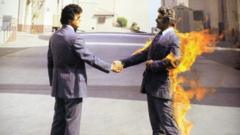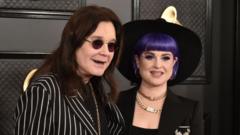Ozzy Osbourne, the celebrated figure in rock history, has died at the age of 76, marking the end of an era for the genre. Known for his role as the lead singer of Black Sabbath, the Birmingham-born artist was pivotal in the creation of heavy metal, with classics like "Iron Man" and "Paranoid" defining the sound of a generation. Just weeks ago, he delivered an emotional farewell concert in his hometown, joined by legends like Metallica and Guns ‘n’ Roses, solidifying his influence in the industry.
His family confirmed his passing in a heartfelt statement that emphasized the sorrow felt at his loss and noted that he was surrounded by loved ones at the time. The cause of his death has not been disclosed, but Osbourne faced numerous health challenges over the years, including a diagnosis of Parkinson’s disease in 2019.
Born John Michael Osbourne, he dropped out of school at just 15 and held various menial jobs before launching his music career. After a stint with multiple local bands, he joined forces with guitarist Tony Iommi, bassist Geezer Butler, and drummer Bill Ward to form Black Sabbath in the late 1960s. The band revolutionized music, releasing their self-titled album in 1970, followed by iconic records such as "Paranoid" and "Master of Reality."
After parting ways with Black Sabbath in 1978, Osbourne ventured into solo success with "Blizzard of Ozz," which featured the hit single "Crazy Train." His performances were legendary for their wildness, including an infamous incident where he allegedly bit the head off a bat during a concert—though many considered this an urban legend. His tumultuous lifestyle also included a well-documented history of substance abuse, leading to strange behavior that became part of his rock persona.
In the late 1980s, Osbourne faced serious personal hurdles, including an arrest for the attempted murder of his second wife, Sharon. The couple later reconciled, marking the start of a new chapter for both in their careers. The 2000s brought a different kind of fame through the reality TV series "The Osbournes," depicting a more relatable side of the rock star.
Despite several setbacks due to health complications, including a serious spinal injury and later surgeries, Osbourne remained a beloved figure in music. His last public appearance was during his farewell concert in July, where he graciously thanked fans, reflecting on a lifetime spent in the spotlight. "You have no idea how I feel. Thank you from the bottom of my heart," he expressed to fans attending the event and those streaming from around the world. Phil Anselmo of Pantera paid tribute on stage, acknowledging Osbourne's enormous influence on countless artists.
His family confirmed his passing in a heartfelt statement that emphasized the sorrow felt at his loss and noted that he was surrounded by loved ones at the time. The cause of his death has not been disclosed, but Osbourne faced numerous health challenges over the years, including a diagnosis of Parkinson’s disease in 2019.
Born John Michael Osbourne, he dropped out of school at just 15 and held various menial jobs before launching his music career. After a stint with multiple local bands, he joined forces with guitarist Tony Iommi, bassist Geezer Butler, and drummer Bill Ward to form Black Sabbath in the late 1960s. The band revolutionized music, releasing their self-titled album in 1970, followed by iconic records such as "Paranoid" and "Master of Reality."
After parting ways with Black Sabbath in 1978, Osbourne ventured into solo success with "Blizzard of Ozz," which featured the hit single "Crazy Train." His performances were legendary for their wildness, including an infamous incident where he allegedly bit the head off a bat during a concert—though many considered this an urban legend. His tumultuous lifestyle also included a well-documented history of substance abuse, leading to strange behavior that became part of his rock persona.
In the late 1980s, Osbourne faced serious personal hurdles, including an arrest for the attempted murder of his second wife, Sharon. The couple later reconciled, marking the start of a new chapter for both in their careers. The 2000s brought a different kind of fame through the reality TV series "The Osbournes," depicting a more relatable side of the rock star.
Despite several setbacks due to health complications, including a serious spinal injury and later surgeries, Osbourne remained a beloved figure in music. His last public appearance was during his farewell concert in July, where he graciously thanked fans, reflecting on a lifetime spent in the spotlight. "You have no idea how I feel. Thank you from the bottom of my heart," he expressed to fans attending the event and those streaming from around the world. Phil Anselmo of Pantera paid tribute on stage, acknowledging Osbourne's enormous influence on countless artists.
















